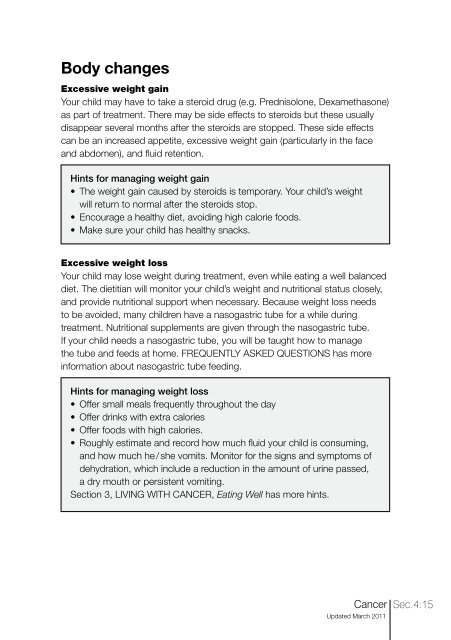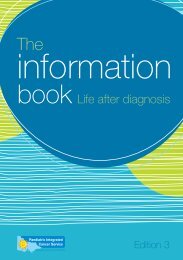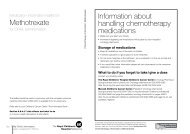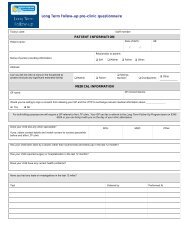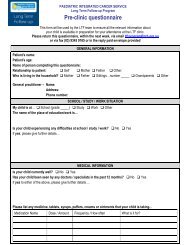The information book - Paediatric Integrated Cancer Service
The information book - Paediatric Integrated Cancer Service
The information book - Paediatric Integrated Cancer Service
Create successful ePaper yourself
Turn your PDF publications into a flip-book with our unique Google optimized e-Paper software.
Body changes<br />
Excessive weight gain<br />
Your child may have to take a steroid drug (e.g. Prednisolone, Dexamethasone)<br />
as part of treatment. <strong>The</strong>re may be side effects to steroids but these usually<br />
disappear several months after the steroids are stopped. <strong>The</strong>se side effects<br />
can be an increased appetite, excessive weight gain (particularly in the face<br />
and abdomen), and fluid retention.<br />
Hints for managing weight gain<br />
• <strong>The</strong> weight gain caused by steroids is temporary. Your child’s weight<br />
will return to normal after the steroids stop.<br />
• Encourage a healthy diet, avoiding high calorie foods.<br />
• Make sure your child has healthy snacks.<br />
Excessive weight loss<br />
Your child may lose weight during treatment, even while eating a well balanced<br />
diet. <strong>The</strong> dietitian will monitor your child’s weight and nutritional status closely,<br />
and provide nutritional support when necessary. Because weight loss needs<br />
to be avoided, many children have a nasogastric tube for a while during<br />
treatment. Nutritional supplements are given through the nasogastric tube.<br />
If your child needs a nasogastric tube, you will be taught how to manage<br />
the tube and feeds at home. FREQUENTLY ASKED QUESTIONS has more<br />
<strong>information</strong> about nasogastric tube feeding.<br />
Hints for managing weight loss<br />
• Offer small meals frequently throughout the day<br />
• Offer drinks with extra calories<br />
• Offer foods with high calories.<br />
• Roughly estimate and record how much fluid your child is consuming,<br />
and how much he / she vomits. Monitor for the signs and symptoms of<br />
dehydration, which include a reduction in the amount of urine passed,<br />
a dry mouth or persistent vomiting.<br />
Section 3, LIVING WITH CANCER, Eating Well has more hints.<br />
<strong>Cancer</strong> Sec.4:15<br />
Updated March 2011


